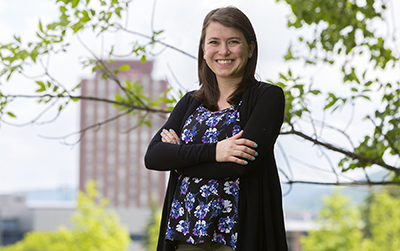
Psychology student wins NSF fellowship
It’s a fact of life that adolescence is tumultuous. Those awkward years between childhood and adulthood are full of possibilities and accomplishments but also rife with social pitfalls, yearnings to fit in and the push to succeed at school and beyond. Adolescence can be one of the most stressful periods of people’s lives.
One the biggest challenges for psychologists studying why some adolescents handle stress well while others don’t is that there’s no answer on whether lab studies and real-world studies are looking at the same phenomenon. That’s why Elizabeth “Cope” Feurer, recipient of a 2016 National Science Foundation Graduate Research Fellowship, will spend the next three years studying whether current laboratory methods of researching stress reactivity reflect the way adolescents experience stress in the real world.
“This is going to help us identify different mechanisms that may explain why some adolescents are more reactive to stress than others,” says Feurer, 24, a Binghamton University doctoral student.
One test places adolescents who have volunteered for the study in a chat room. They’re told the other participants are peers their age and they have to create a profile that’s representative of how they see themselves. They can then choose whether or not to interact with the other “peers” in the chat room.
“What happens is they’re either getting accepted or rejected by their peers,” Feurer says. “We’re looking at people’s brain waves and we’re looking at different neural responses — different electrical signals in their brains — when they are presented with information that they’ve either been accepted or rejected by a virtual peer.”
The other experiment sounds even more, well, stressful: “We tell them they have to give a speech about their ideal job in front of a panel of judges,” she says. “And essentially the judges give no positive feedback, very blank faced, giving stressful cues like, ‘You still have time, you need to keep going.’ Also, we ask them to count backwards out loud by 17s, starting with the number 2023. And we have judges who say, ‘You need to be faster. That’s incorrect, you need to start from the beginning.’”
Feurer says this type of experiment is important because people’s responses in this situation may help researchers predict how they will respond to other kinds of stress.
The drive to understand whether lab results match real-world results is crucial, says Brandon Gibb, Feurer’s advisor and a professor of psychology at Binghamton. “Isolated studies of one aspect of a phenomenon are no better than the old story of blind men trying to understand an elephant by focusing on only one part of the animal,” he says.
“To truly test our models, we must determine whether they generalize to phenomena outside the lab, ideally reactions to real-world stressors,” he says. “Cope’s project does exactly this, using state-of-the-science approaches.”







